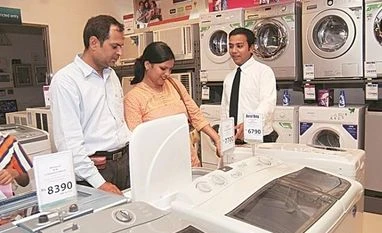The nine-day Navratri festival, which concluded with Dussehra on Wednesday, has brought unexpected riches to retailers of consumer-facing firms despite persistently high inflation and rate increases by the Reserve Bank of India.
Most of them said the first leg of the period from Navratri to Diwali had been the best in the past two to three years as consumers lapped up everything -- from cars and electric scooters to mobile phones, consumer appliances and apparel.
The bounty comes after two consecutive years of Covid-induced dry spells.
E-commerce firms alone are expected to garner sales worth $11.8 billion this festive season, according to Redseer.
This is more than double the pre-pandemic figure of $5 billion in 2019.
Among all consumer products, the car delivery numbers stand out and the Navratri has added more heft to the already buoyant trends in the segment.
In total, 175,000 cars are estimated to have been delivered in the past 10 days compared to 80,000 in the same period last year, according to industry sources. There were deliveries of around 175,000 units in FY21 too.
Reflecting the broader market trends, dealers of car market leader Maruti Suzuki India delivered 81,000 cars to its customers in the 10 days from September 26 to October 5. This is the best in two years, said Shashank Srivastava, executive director at the firm. In the comparable period last year, 36,000 cars were delivered. In FY21 this number stood at 80,000 units, he said.
Srivastava attributed this to robust demand and the easing of semiconductor shortage, which, in turn, has helped the firm to produce more.
“In addition to the festival, the month-end effect, which typically increases sales, also helped,” he said.
He, however added, aligning production to demand remained one of the biggest challenges. In Maruti’s case, for instance, the firm is able to produce more of entry-level models such as the Wagon R, Alto, and Celerio but the demand is higher for premium models, including the recently launched Vitara, Brezza, XL6, to name a few. As on October 5, Maruti had an order book of 420,000 cars, he said.
Manish Raj Singhania, president, Federation of Auto Dealers Association (FADA), said: “The lacklustre sales seen during Ganpati went into reverse and we expect the first leg of the season to conclude on a positive note.”
Riding a strong retail momentum Ola Electric said it recorded four times growth during the Navratra festivities, selling one scooter every minute.
Anshul Khandelwal, chief marketing officer at the firm, said: “We will consolidate our market leadership and look forward to a bumper October.”
E-commerce firms and online retailers too have been having swinging times.
Even as online sales helped Super Plastronics, the brand licensee of Kodak, Thomson, Blaupunkt and Westinghouse in India, which witnessed higher than expected growth during Navratri, it has been a late start to the season for Vijay Sales.
Avneet Marwah, chief executive officer of Super Plastronics, said he expected sales to be up by 35-40 per cent this festive season. But demand has been much better. “Our sales have been up 100 per cent in the past nine days on the back of great demand witnessed online,” he said.
Nilesh Gupta, managing director at Vijay Sales, said: “In the past nine days, sales could have been better, but they have started to catch up today and by the end of the day we expect them to enter double digits. The double-digit increase in sales is expected to continue till Diwali.”
Apparel sales have been strong during the Navratri season and retailers expect them to be better.
“The past nine days saw sales growth of 35 per cent compared to last year and we expect them to go up to 40 per cent,” said Manish Kapoor, CEO of Pepe Jeans India.
Lacoste India also saw strong sales during Navratri.
“In the past nine days, it saw sales over 50 per cent compared to 2019, which is higher than what we expected,” said Rajesh Jain, CEO of Lacoste India.
Meanwhile, e-commerce retailers led by Amazon and Flipkart, which kick-started the season ahead of Navratri on September 22, were on track to register sales worth $5.9 billion, a 28 per cent increase over last year during the first festive week, according to consulting firm Redseer.
For the first four days (September 22-September 25), e-commerce platforms had already clocked sales of $3.5 billion.
The e-commerce industry witnessed growth in order volumes of 33 per cent during the first 10 days of the festival season as compared to that in 2021, said a spokesperson at e-commerce technology firm Unicommerce.
“The two categories that reported the fastest growth are electronics and home appliances (excluding mobile phones) and beauty and personal care with over 60 per cent year-over-year order volume growth,” the spokesperson added.
With the first leg of the festival season concluding on a strong note, consumer appliances, auto and e-commerce firms expect Diwali to add further momentum to the recovery underway.
Unlock 30+ premium stories daily hand-picked by our editors, across devices on browser and app.
Pick your 5 favourite companies, get a daily email with all news updates on them.
Full access to our intuitive epaper - clip, save, share articles from any device; newspaper archives from 2006.
Preferential invites to Business Standard events.
Curated newsletters on markets, personal finance, policy & politics, start-ups, technology, and more.
)